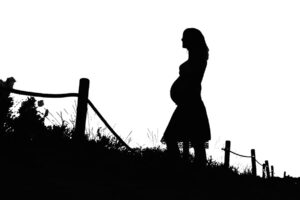From Mary’s fiat to the prophets of the Old Testament, God repeatedly calls His people to “be not afraid.” Yet, despite the blessings of a comfortable life, I am prone to fear. As a newlywed with plans to attend medical school and dreams of building a family, I have spent the last few years in ongoing, tortured deliberations about how I could possibly balance being both a mother and a doctor-in-training. These worries persisted even though I have remarkable support to pursue each of these beautiful, demanding callings. My anxieties peaked when my husband and I found out, shortly after moving to Casa Juan Diego, that I was pregnant—a joyful possibility we had been open to, but had not exactly planned for, either.
What I hadn’t anticipated was for my time as a pregnant Catholic Worker at Casa Juan Diego to transform my heart. This home, which strives to be radically hospitable to life, has shown me the courage and faith of many young mothers who trust God through life’s trials and joys. Rather than growing embittered or cynical, the hardship of some of our guests’ lives has pushed many of them to trust God more, not less. Courage is not the only antidote to fear–trust is, too. The powerful witness of our guests has moved me to be bolder, braver, and less afraid.
I remember the day I welcomed “Ari” and her husband to Casa Juan Diego. I noticed a small but solid baby bump under her sweater, one that seemed small for a third trimester pregnancy. I soon learned it was the result of inadequate nutrition on her journey. “I’m pregnant too,” I shared, feeling an immediate connection and an urge to try anything to help ease their burdens. Over the coming weeks, other volunteers and I spent hours with Ari, navigating long hold times on the phone to establish her medical care here in Houston. We plied her with clothes and diapers for her baby boy, stocked her with Ensure shakes and Ziploc bags of sliced cheddar cheese to help her gain weight.
I heard more from Ari about the hardships she and her husband endured before arriving at Casa. With bus fare out of reach, they walked hours through city streets in search of churches serving free meals. Once, she passed out from exhaustion. Reflecting on my own pregnancy and times that I have found myself desperately, irrationally hungry, I nearly cried imagining another pregnant woman going without enough to eat. Later, I learned of the time a cartel member boarded their bus in Mexico and threatened to shoot Ari’s husband in the throat, until a fellow passenger bribed him away. As I thought about the deeper sense of dependence I’ve come to feel on my husband during my pregnancy, I could hardly fathom the trauma of facing such a close call with evil and death.
The stories of our guests regularly confront me with the age-old problem of evil, a mystery I’m certain I will never fully understand on this side of eternity. Yet, one reflection shared by a fellow Catholic Worker over dinner has stayed with me: that something essential about the problem of evil is revealed through Christ’s crucifixion. Jesus’s passion shows us that God is not One who subjects us to evil, but rather is One who entered humanity incarnationally and willingly suffered the worst agony and humiliation. God suffers our trials and heartache in solidarity with us. Not only that, He is constantly caring for us, even when we don’t understand how.
This faith shines through in many of our guests, who have lived through trials that would much sooner embitter me. Remarkably, they do not blame God. Though evil may exist, they see God in those critical moments of grace: God who provided that fellow passenger with money and the will to speak up, God who gave the strength to move forward despite exhaustion and brushes with death, God Who guided this little family to Casa Juan Diego, a safe refuge.
Learning from the courage and faith of our guests has freed me from fear, freed me to focus on the simple discomforts of pregnancy and the joy of expecting. At Casa, women I have come to know place affectionate hands on my belly, with cheerful speculation about whether I am having a boy or a girl. One woman I met a few months back, who fled intimate partner violence with a 6-month-old and who misses her two older children back in El Salvador, sent her congratulations upon hearing about my pregnancy. “A child is the greatest blessing you can imagine,” she wrote. I reflected on her words. New life is the most exquisite and demanding gift, even to women whose lives are magnitudes harder than mine. The challenge before me of caring for my child while studying the most worthwhile thing I can imagine, is one I face now with gratitude and trust—bolstered by the witness of those around me that trust in a God who sustains us, who walks beside us through the darkest valleys, and gently tells us: “Be not afraid.”
Houston Catholic Worker, April-June 2025, Vol. XLV, No. 2.


